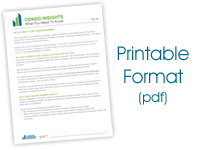If waterlines freeze, they burst. Property damage can be significant:
- If your building is heated by water that circulates through baseboard pipes, it is critical that these waterlines do not freeze.
- Electric zone valves on the pipes are controlled by the thermostat to lower or raise room temperature. If ice forms anywhere in the pipe, the waterline pressure increases and can cause the valve to fail and release the water into the room.
- The system has an unlimited supply of water. A tremendous amount of damage can result before the water is turned off. Often suites adjacent and below are affected. The water can travel down several floors and leave a trail of destruction.
- The cost affects all owners. Damage from a burst pipe can cost thousands of dollars to repair. It is usually insured, but there are financial consequences to all owners. Owners pay the bills. Insurance premiums and deductibles will increase. Deductibles can increase to $50,000 or more. The deductible expense is paid either by the condominium corporation (the owners) or, if it is determined that the resident is responsible for the frozen pipe, it may be assessed to the unit owner. If there are too many claims, it can be difficult for the corporation to renew their insurance.
Do your part to prevent frozen pipes:
- If your unit is too warm, contact your Condominium Consultant. Do not open a door or window to cool the suite.
- A window or patio door left open in cold weather is the usual cause of a frozen waterline.
- Window coverings and furniture should not cover or block the baseboard heating. This can channel cold air down the wall and freeze the waterlines.
- Learn how to shut the water off in case of an emergency. Shut off valves are located at the pipe’s entrance to and exit from your suite.
When the temperature is at or below zero:
- Never leave a window or patio door open. A space of just one inch can cause a pipe to freeze within minutes. Cold air is heavier than warm air. Even if the window is five feet above the floor, the cold air will travel to the floor and freeze the waterline.
- Do not prop open outside doors for easy access; pipes in the stairwells or foyer may freeze.
- Do not set thermostat below 17 degrees during cold weather. The zone valve needs to cycle on and off regularly to allow water to flow through the pipe to prevent ice.
- Never turn the thermostat completely off.
Unit owners are responsible to insure their own unit.



